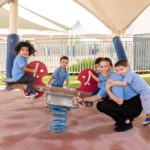There are many simple ways to boost your child’s Self-esteem. You child’s self-esteem is developed as a direct result of experiences that help a child feel capable, effective, and accepted. And here is how to achieve that.
Firstly, kids feel capable when they learn to do things for themselves and feel proud of tasks that they can do independently.
Secondly, children feel effective when they see that good things come from their efforts, like trying hard at making breakfast on their own or contributing to a family project. Finally, children will feel accepted if they are accepted whether they failed or succeeded.
If children feel accepted by a parent or someone close, they are likely to accept themselves, too. Their good feelings about themselves multiply as parents praise good behaviors, help when needed, and give encouragement and support. To achieve that try these six easy tips:
-
Let them lead
Learn to step back and let your child take risks, make choices, solve problems and stick with what they start. If you keep doing things for them the message you are giving is “you are incapable and thus I have to do things for you.” However, if you allow them to do things themselves that are developmentally appropriate the message you give them is “You can do this by yourself, I believe in you!”. Of course, the first time a child tries a task you can be there to scaffold and lead the way. However, make sure you give the child space as soon as she’s showing signs that she is capable.
-
Praise the effort not the result
If a child needs to work on a skill, which is oftentimes the case, then he needs a lot of effort to get the final stretch. So, if you’re aiming for your child to get an A in math and he is currently getting a D, we need to offer praise for studying for a C, then achieving a C, studying for a B, then achieving a B, studying for an A, then achieving an A. If we only praise the final result (achieving an A) then we have skipped a lot of essential stages of praise. Praising the effort will lead to the child naturally and gradually leading his best potential. The message you give him is “ I accept you as you are, I believe in your ability to do better and will help you along the way.” Rather than: “you will only succeed if you get an A.”
-
Make the praise sincere
Praise that doesn’t feel earned doesn’t ring true. For example, telling a child she is the smartest child in the world feels hollow and fake and children will know the difference. Rather, you can say: “I really like how you got a B on your spelling test, way to go!” This way children can store real life examples in their head and their self-esteem builds up. So, their self-talk would sound like: “I got a B on that spelling test I must be good!” Rather than: “ Mom says I’m the smartest child in the world, but that’s not true, she’s just saying this because she’s my mom.”
-
Say no to harsh criticism
The messages kids hear about themselves from others easily translate into how they feel about themselves. Harsh words (“You’re so lazy!”) are harmful, not motivating. When kids absorb negative messages about themselves, they feel bad about themselves, and act accordingly.
-
Focus on strengths.
Pay attention to what your child does well and enjoys. Make sure your child has opportunities to develop these strengths. Nurturing strengths is better than focusing on weaknesses if you want to help kids feel good about themselves and succeed.
-
Make sure goals are developmentally appropriate
Start with tasks that are easy for your child so they can feel good about themselves then build on that. So, if your child is struggling with reading at his grade level, lower him down a level or even two. Start there then build you way up as he gains the skills.
The Camali clinic team recommends some toys and activities that will support your efforts in developing your child’s self-esteem; for that purpose it’s always good to look for achievement toys, where your kids playing efforts can be reflected through a result to give him a good feeling about his capabilities. Examples of these toys are puzzles, building blocks, Arts and crafts, and playing dough.
Also read: Raising confident kids to not bow to peer pressure






